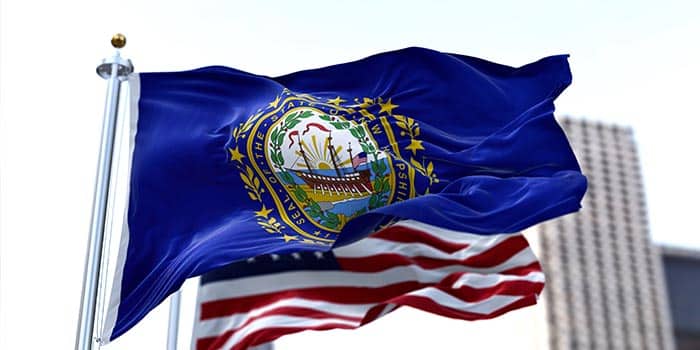- Casino
- By State
- Alabama
- Alaska
- Arizona
- Arkansas
- California
- Colorado
- Connecticut
- Delaware
- Georgia
- Florida
- Hawaii
- Idaho
- Illinois
- Indiana
- Iowa
- Kansas
- Kentucky
- Louisiana
- Maine
- Massachusetts
- Maryland
- Michigan
- Minnesota
- Mississippi
- Missouri
- Montana
- Nebraska
- Nevada
- New Hampshire
- New Jersey
- New Mexico
- New York
- North Carolina
- North Dakota
- Ohio
- Oklahoma
- Oregon
- Pennsylvania
- Rhode Island
- South Carolina
- South Dakota
- Tennessee
- Texas
- Utah
- Vermont
- Virginia
- Washington
- West Virginia
- Wisconsin
- Wyoming
- By State
- Slots
- Poker
- Sports
- Esports
Oklahoma Tribes Sue Gov. Kevin Stitt over Compacts Expansion

As of today, January 1, 2020, all tribal operators in Oklahoma and their vendors are deemed illegal after Gov. Kevin Stitt and Native American casinos failed to negotiate gambling compact expansion measures in December.
Tribes File a Lawsuit against Gov. Kevin Stitt to Contest New Gambling Expansion Rules
Oklahoma’s Cherokee, Chickasaw and Choctaw nations have filed a lawsuit against OH Governor Kevin Stitt over failure to extend tribal compacts starting January 1, 2020, for another 15-year period. The tribes filed the lawsuit with a federal judge on Tuesday, December 31, 2019.
After cautioning Governor Stitt to reconsider earlier this week, and avoid targeting tribes and affiliated businesses, such as vendors, the tribes are finally taking matters to court.
Native Americans Criticize Governor over the Tribal Compacts Impasse
Cherokee Nation Chief Chuck Hoskin, Chickasaw Nation Gov. Bill Anoatubby and Choctaw Nation Chief Gary Batton all joined an official statement on Tuesday criticizing the governor, the Associated Press reported.
“For some time, we have tried to establish meaningful intergovernmental engagement regarding our gaming compacts, but you have continued to reject our compacts’ plain terms. Recently, you have gone further, stating allegations against us and threats to our operations,” the statement read.
While Gov. Stitt hasn’t been opposed to compacts expansion, he has been vociferous about certain changes in the way they are awarded. Throughout December, Gov. Stitt’s office tried to set up meetings with tribal representatives, but they were all turned down due to demands that the tribes regarded invasive.
Yet, some agreed. In fact, two of the 39 tribes in the state, to name the Kialegee Tribal Town and United Keetoowah Band of Cherokee Indians, have managed to negotiate an extension of the compacts for at least eight months.
The Governor’s Office Offered Extension, Says Stitt
Gov. Stitt has responded to criticism by arguing that he has offered extension to all federally recognized tribes running a gambling business. Furthermore, all tribes are still welcome to join the expansion move initiated by the state, he said.
However, tribes haven’t been happy with the measures, describing them as arbitrary and temporary. But why the rift? It all started back in the summer, when the governor wrote an op-ed column and expressed his ambitions to change the way tribal compacts are negotiated.
At the time, Gov. Stitt said that renewing the compacts as were would be easiest. However, he also laid out his reasons for seeking a change in the existing arrangement:
“[…] Voters elected me to look at everything in state government with a fresh eye and, where necessary, make the difficult decisions that are in the best interest of all 4 million Oklahomans.”
That prompted Lisa Billy, the governor’s aid on tribal matters, to quit as she saw Gov. Stitt’s move as inviting unnecessary conflict between an established way of handling matters of tribal gambling and the state. As of today, January 1, Oklahoma’s tribes are officially illegal.
As per the present arrangement, tribes are supposed to contribute between 4% and 10% of their gross gaming revenue (GGR), known as “exclusivity fee.” The first tribal compacts were established in 2004 and has been contributing to the state budget like clockwork every year.
So far, some $2.3 billion has been accumulated for the state’s coffers through gambling compacts. Meanwhile, Oklahoma is home to some 130 gambling venues all across the state, from resorts to gas station casinos.
Related Topics:
Rachael is a veteran gaming journalist with over 9 years of writing experience but has only just started within the gambling industry. She has built a keen interest within the iGaming sector over the years from exposure at events and intends to translate her passion into publications here at GamblingNews.com to keep our readers updated with the latest developments.
Must Read
Legal
June 26, 2025
Entain Loses Trademark Battle in EU Copyright Clash















